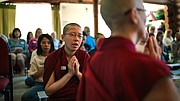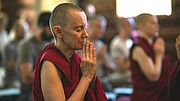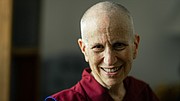Sravasti Abbey 'Creating peace in a chaotic world'
Venerable Thubten Damcho checked all the boxes to make her parents in Singapore happy and herself miserable.
Straight A’s led to a scholarship at Princeton with a requirement to return home to work for the government for six years.
“And here are the parents at graduation. So proud, so proud. And I was just drunk for those two weeks and miserable. Totally miserable,” she said. “It was like maybe the answer to happiness is not all this stuff that’s outside, so when I went back to Singapore I began to search more deeply for a spiritual path.”
She became acquainted with a Buddhist monk and spent a noticeable amount of time in a nearby temple. Damcho’s mother soon found that her daughter intended to pursue a monastic life as a nun.
Damcho said it led to soap-opera tears.
“My sister is an Evangelical Christian, so she thought I was going to Hell. She also cried for a good year or so,” she said.
After years of personal reflection, she attended a class led by Venerable Thubten Chodron in Singapore, and fell into the orbit of the spiritual leader.
In time, she became an ordained Buddhist nun and followed Chodron, eventually residing 20 minutes south of Newport, Washington in Sravasti Abbey, a Western Tibetan Buddhist monastery where 14 other ethnically diverse monastics reside.
Chodron, a practicing Buddhist now for 43 years, established the abbey in 2002 and purchased its property in 2003 after a lengthy search throughout Idaho for an adequate piece of land.
“The original residents were me and two cats,” Chodron said.
Though, as the first and still only Western abbey in the Tibetan tradition that trains students in the region, the abbess soon found a following, Venerable Thubten Chonyi said. Chonyi had become well acquainted with Chodron in the mid-’90s at a Seattle Buddhist center where Chodron taught.
Chodron, having been ordained as a nun in 1977, received an endorsement from the Dalai Lama in her effort to establish a western abbey.
“Over recent years as interest in Buddhist teachings has grown in Western lands, monastics have faced various difficulties. Now that Bhikshuni Thubten Chodron is endeavoring to provide a situation in which Western monastics can pursue the discipline exemplified by our teacher, Buddha Shakyamuni, in a stable manner, I am happy to give her my support and encourage others who share this interest to do likewise,” His Holiness the Dalai Lama wrote in December of 2002.
Chodron said her teachings are universal, and can be borrowed by all walks of life.
“Our little brand is creating peace in a chaotic world, so that’s what we want to offer people,” she said. “We believe in ethical conduct and treating people with respect, love and kindness, and cultivating actual love and compassion in our own minds.”
This is evidenced by their service to the local community, Chonyi said, but also through their unique economic model.
They operate on an economy of generosity, opening their doors to the public to provide their services, teachings and guidance for free to all those who seek it. In Buddhist practice, ordained members generally do not handle currency and may not even ask for it.
They also do not buy food.
“We only eat what people bring and what people offer to us. This goes back to the tradition that the Buddha set up and it makes us dependent on other people. This helps our practice because we’re quite aware of other people’s kindness and want to reciprocate,” Chodron said.
Damcho, who moved to Sravasti Abbey in 2013, said abbey residents also learn to be kind to themselves, developing self-awareness and understanding through empathetic mindfulness.
“I think in the first few years we work a lot with our different disturbing emotions, In the first few years I watched my own anger come up [and] got in touch with that. Previously I didn’t think I had anger,” she said. “I’m slowly applying the tools. Having anger doesn’t mean I’m a bad person — it’s just I didn’t pay attention to this aspect of myself before. It was always there. I just didn’t stop to look at my own mind.”
Another international monastic resident, Venerable Thubten Lamsel from New Zealand, echoed similar sentiment.
“It’s just part of the training where we’re cultivating a heart that’s wanting to be filled with love and compassion and not focus on building up this identity of ‘How good am I?’ and ‘Tell me you love me’ and that kind of stuff.”
Lamsel said in the abbey, residents and guests have time to get to know themselves, and understand that if one isn’t happy with the way they’re living then they may seek out an alternative.
Lamsel, like Damcho, sought her own alternative after developing inner peace through spiritual practice.
Lamsel, who has a master’s degree in public health and worked as a researcher, said she studied in a Dharma Center from 2011 to 2014, and found that through spiritual practice she was a kinder and more balanced person, able to contribute more and do less harm to the world around her.
Balancing that spiritual rigor against the rest of her life, however, would require a significant decision in 2014.
She chose to ordain.
Lamsel left her partner, worked to pay off her student loans and later visited Sravasti Abbey in 2016. She had read a booklet written by Chodron for those considering ordination.
After years of effort and study, she became an ordained nun in February. Although she feels fulfilled in this current path, she said the transition has been difficult.
“You have to let go of your limited and confining identity,” Lamsel, 28, said.
The result in part is a change intended to provide service and aid to those who need the monastics’ help, be it in the abbey’s surrounding community, wherever they travel or for their broad assortment of guests.
“That’s what being here is about: transforming our minds for the benefit of others,” Damcho said







